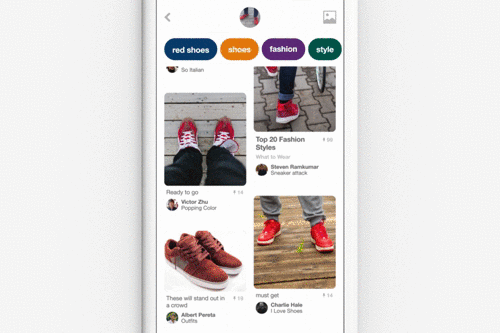Welcome to our weekly round-up of all the latest news and research from the world of search marketing and beyond.
This week, Mobile World Congress confirms that mobile video is massive; Pinterest has launched its new Lens visual discovery tool to the US; and Target's stock has reached a two and a half year low, despite being confirmed as the most effective marketer in retail.
Meanwhile in the UK, Google has come under fire over its advertising appearing next to extremist material; and Chinese search giant Baidu has released an AI-powered transcription app.
Mobile video is massive at Mobile World CongressThe annual Mobile World Congress in Barcelona recently drew to a close, but industry pundits and publishers are continuing to analyze the the discussions and product demonstrations that were held over the Congress' four days.
One thing that the Mobile World Congress confirmed, says ClickZ mobile expert Andy Favell, is that mobile video is the most important trend in marketing at the present moment.
If video is the new mobile (Facebook CEO Zuckerberg told shareholders in February 2017 that the company was going "video-first" because "video is a megatrend on the same order as mobile"), then mobile video is the giant honeypot.
And publishers, broadcasters, social media, content creators and creative/digital agencies are swarming all over it.
In his column for ClickZ, Favell examines the continued rise of native advertising in the context of video, why brands are falling in love with video, the impact of data and whether brands and agencies need to rethink video production.
Pinterest launches its Lens visual discovery tool to the USAs we've reported on Search Engine Watch in recent months, Pinterest is continuing to evolve into a force to be reckoned with in visual search, and its future business model clearly seems to revolve around the ability to help users discover visual ideas using its platform.
To that end, Pinterest has just launched the long-awaited Lens, a visual discovery tool that works by using a person's smartphone camera to detect an object and find visually similar items on Pinterest.

Search Engine Watch contributor Clark Boyd took the new tool for a test drive to see how well it works in practical terms, and what this might mean for visual search.
Target is confirmed as the top digital retail marketer – so why is it struggling?According to the newly-released The Best Digital Marketers in E-Commerce report, produced by Internet Retailer, Target is the most effective marketer in online retail.
The reports scored how effectively each ecommerce brand marketed itself across email, paid search, organic search and social media marketing, and Target Corporation walked away with the crown thanks to its use of up-to-the-minute marketing tools, and use of customer data to target (ha, ha) its marketing.

So why, then, has Target missed earnings expectations and seen its stock reach a two and a half-year low? Al Roberts looks into why, despite having developed an effective digital marketing engine, Target has been forced to cut into margins, and still isn't driving sufficient foot traffic to its physical stores.
British advertisers pull Google ads over extremist contentGoogle has come under fire in the UK and seen a number of British advertisers withdraw their business over the past couple of days, after it emerged that their advertising was appearing next to extremist material online.
The British government, the Guardian newspaper and Channel 4 are among those who have pulled advertising from Google and YouTube in the wake of the discovery, and Google has been summoned for discussions in the Cabinet Office to reassure the government on how it plans to deliver "the high quality of service government demands on behalf of the taxpayer."
Isba, an organization representing some 450 British advertisers, also called on Google to review its advertising policies.
 Image by Personeelsnet, available via CC BY-SA 2.0
Image by Personeelsnet, available via CC BY-SA 2.0
At the heart of the controversy is programmatic advertising, which automates the process of buying and selling advertising online, but can result in advertising material appearing in unforeseen places. Late last year, a number of brands and groups – including Kellogg, U.S. Bank and the Anti-Defamation League – discovered that their advertising was being displayed on the extremist "alt-right" website Breitbart News.
Baidu launches AI audio transcription app SwiftScribeBaidu, the Chinese internet giant and China's answer to Google, is making artificial intelligence its focus for 2017.
In February China's National Development and Reform Commission appointed Baidu to lead a new AI lab, and in the same month, Forbes wrote that "Baidu is currently considered to be pack leader amongst the Chinese internet giants as they race to develop and deploy machine and deep learning technology."
This week we are beginning to see the fruits of Baidu's labor, as Baidu announced the launch of SwiftScribe, a web app which uses AI to help people transcribe audio recordings more quickly.
A blog post by Baidu Research announcing the tool called SwiftScribe "a breakthrough in AI-powered transcription software", and claimed that it had the power to cut transcription time down by 40 percent.
"The core technology powering SwiftScribe is Baidu's speech recognition engine, Deep Speech 2. Its neural network, which is trained on thousands of hours labeled audio data, learns to associate sounds with certain words and phrases. In addition to advanced ASR technology, we designed intuitive shortcut keys and innovative human-computer interaction to solve the problem of discontinuity, one of the biggest obstacles users face when transcribing.
SwiftScribe was designed for anyone who does transcription regularly – freelancers, transcriptionists working for transcription service companies, and data entry specialists. Because of its wide user base, SwiftScribe has the potential to positively impact a range of industries that benefit from transcription, including medical and healthcare, legal and law enforcement, business, media, and others."
Rebecca Sentance is the Deputy Editor at ClickZ and Search Engine Watch.
Want to stay on top of the latest search trends? Get top insights and news from our search experts.
Related readingThis week, Google's emoji conquest of the SERP is advancing on AdWords titles, Snapchat influencers may be fleeing the platform for greener pastures, and an unconfirmed ranking update dubbed "Fred" has been shaking up the SERP.
On February 28, 2017, ClickZ Intelligence presented the webinar 'Still using .com? Here's why 50% of all Fortune 500 companies are about to use .brand' in association with Neustar.
This week, we follow up on the launch of Google's new ad label to ask how it will impact marketers, and look at attempts by Google's tech incubator Jigsaw to clean up language on the internet.
Many tools provide access to their APIs, aiming to facilitate routine work for specialists. APIs can make SEOs' lives much easier by ... read more
Source: Five most interesting search marketing news stories of the week
No comments:
Post a Comment